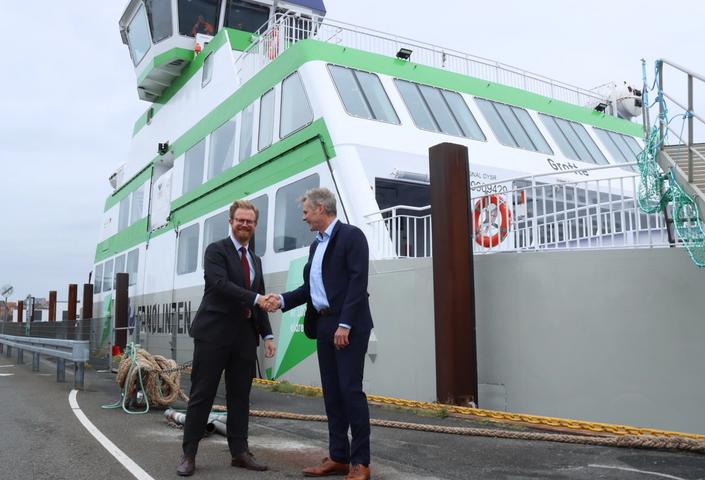Molslinjen sets sail towards green ferry transportation by launching its first electric ferry

On 1 October, EQT Infrastructure portfolio company Molslinjen, Denmark’s largest passenger ferry operator, started operating its first fully electric ferry on one of its most popular routes. The new electric ferry, Grotte, will provide a sustainable means of transportation connecting the Danish coastal town of Esbjerg with the Fanø island off the coast of southwestern Denmark. The launch is part of Molslinjen’s broader sustainability agenda, aiming at decarbonizing some of the most important travel corridors in the country.
Operating in a country of many islands, Molslinjen is a critical part of Denmark’s transportation infrastructure. Molslinjen’s network of “floating bridges'' connects major population centers and creates a link between several important islands and the mainland. Being an indispensable element of the Danish transport infrastructure, Molslinjen has a great opportunity to transform the sector for the better.
EQT Infrastructure acquired Molslinjen in March 2021 after having recognized the great potential in supporting the company’s sustainability agenda through dedicated investments into the decarbonization of its ferry fleet and an acceleration of its transition to renewable fuel sources.
Molslinjen’s first ever electric ferry, Grotte, is propelled by two electrical propulsion motors and charges automatically when docked in the harbor in Esbjerg. Grotte complements the two existing ferries on the Fanø route, Fenja and Menja, enabling a three-ferry operation and creating additional capacity on the route that carries 1.8 million passengers every year. Fenja and Menja is currently transitioning to fossil free biofuel and with the new ferry set-up in place, CO2 emissions on the route will be reduced up to 96 percent, compare to if the three ferries operated on marine diesel.
Carl Sjölund, Partner within EQT Infrastructure’s Advisory Team, said, “We are on a mission to future-proof Molslinjen as it continues to be a market leader in the drive towards more sustainable maritime transportation and a greener tomorrow. EQT Infrastructure supports the management team in their ambition to continue investing in sustainable and innovative solutions for Molslinjen’s ferry fleet in order to reduce the company’s carbon footprint. Electrification is part of the solution, and we look to play an important part in putting in place the next generation of sustainable ferries for Denmark’s wider transportation infrastructure network.”
Carsten Jensen, CEO of Molslinjen, said: “We have very much been looking forward to seeing Grotte in action, and as an important transportation infrastructure company, we are looking to embrace new technology that will help lead us and Danish ferry operations to form a greener future. Grotte is a small ferry on a short route – but for us it is a big step on an important journey to become carbon-neutral by actively investing in sustainable transportation infrastructure.”